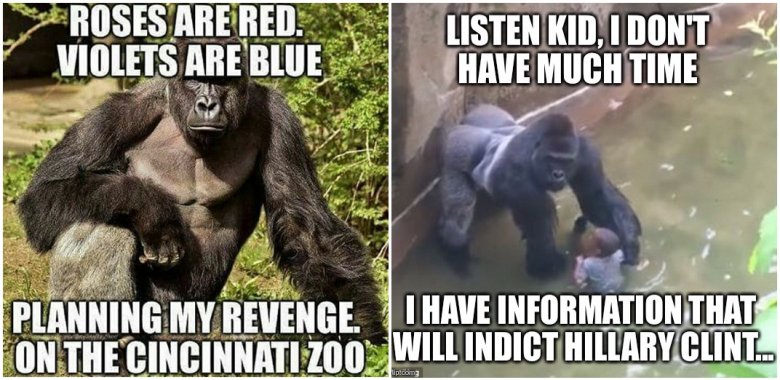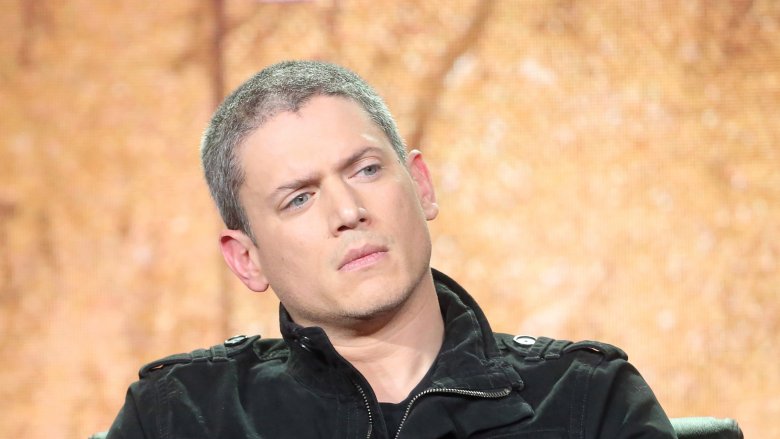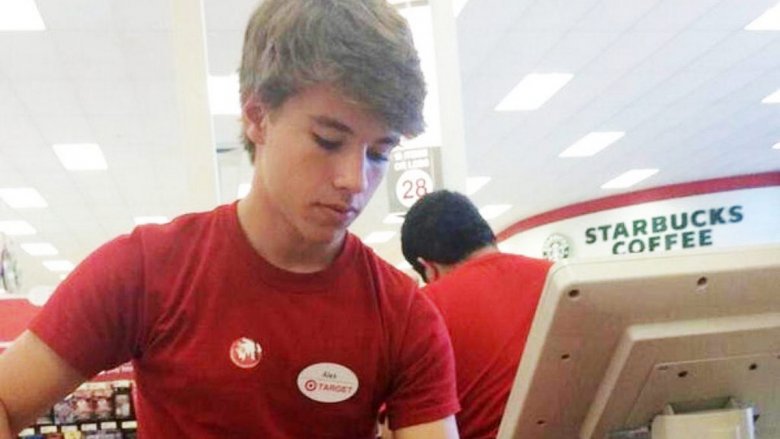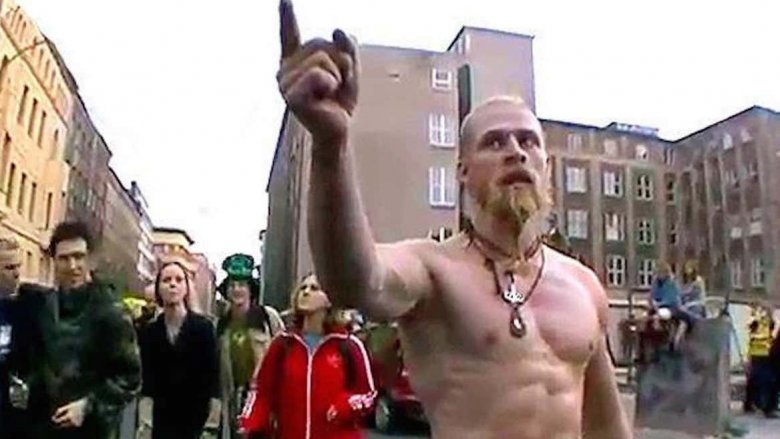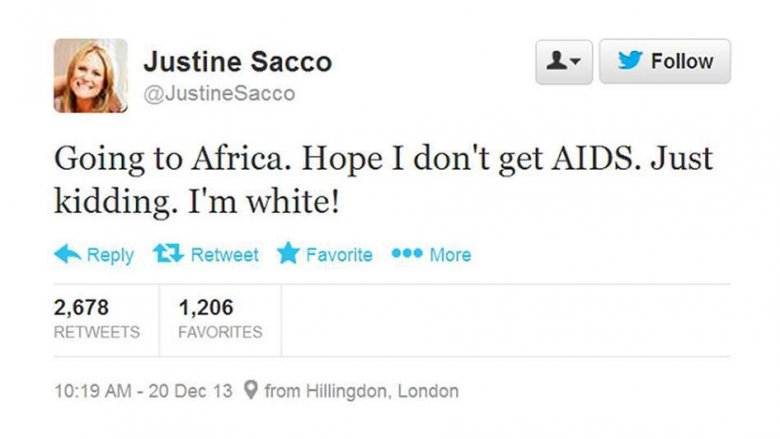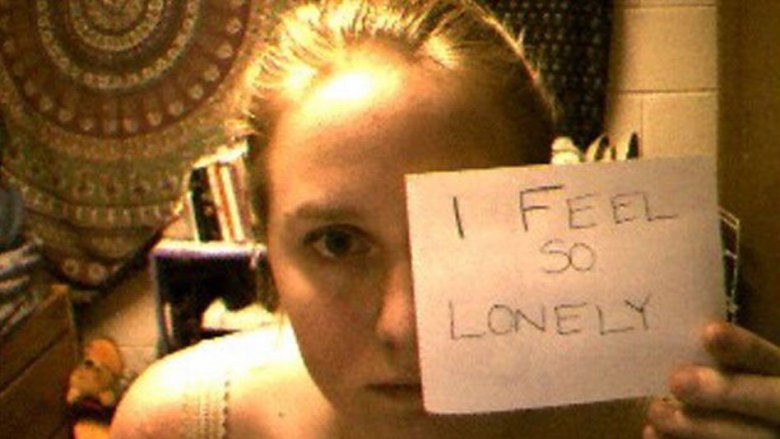Memes That Destroyed Lives
Like it or not, it's looking like memes are going to be one of the current generation's crowning cultural legacies. People will look back at Salt Bae and Socially Awkward Penguin with the same kind of reverence and fascination that we have when we look at Ancient Egyptian hieroglyphics, or dirty graffiti from Ancient Rome. But the internet is a cruel mistress, and behind a lot of those image macros, misjudged tweets, and embarrassing videos lie some very real and very damaging consequences for some very real humans. So if people do look back at our memes with any kind of anthropological curiosity in the future, they really ought to know the full, naked truth about viral superstardom and the damage it can leave in its wake. Let's help them out with that.
Harambe
Among other monumental bummers, 2016 will be remembered as a particularly bad year for high-profile deaths, with the sheer volume of celebrity losses reaching almost absurd levels over the course of the year. In the middle of all this was Harambe, the 17-year-old silverback gorilla who was shot dead after a 4-year-old boy climbed into his enclosure in the Cincinnati Zoo. While the incident initially inspired a seemingly genuine outpouring of sadness and anger, this soon gave way to increasingly ironic memorializing and a veritable bounty of meme goodness. But for a while there, the outrage was very real.
Among those targeted were the Cincinnati Zoo's staff, with zoo director Thane Maynard's Twitter account getting hacked a couple times and bombarded with Harambe memes during the period. In an email to the Associated Press, Maynard expressed his staff's immense grief over the death of the gorilla and how the constant memes were making it difficult for them to mourn their loss properly and move on.
But the continuum of blame and harassment really leaned most heavily on the child's mother, Michelle Gregg. As reported by the BBC, Gregg suffered a torrent of harassment online, including death threats.
Wentworth Miller's weight gain
Celebrities are certainly not immune to the ways of the meme-makers, and quite often they're more than happy to play along. Even Sad Keanu earned a seal of approval from the man himself. But sometimes things are a little more complicated, like when Prison Break actor Wentworth Miller found himself the subject of a meme poking fun at his weight gain in March 2016. Originally posted by the LAD Bible on its Facebook page, the meme consisted of a promo pic of Miller from his Prison Break days side-by-side with a more recent photo of the actor sporting a slightly paunchier frame. The accompanying caption read "When you break out of prison and find out about McDonald's monopoly..."
It couldn't have come at a worse time for Miller, who was suicidal during this period and said the first time he saw the meme pop up in his feed, "it hurt to breathe." He took the opportunity to speak openly about the struggles he'd been going through at the time and throughout his life, and to encourage those facing the same struggles to reach out for help. The Lad Bible subsequently took the post down and issued a public apology to the actor.
Pepe the Frog
This anthropomorphized little green dude began life innocently enough as a character in a 2005 comic strip called "Boy's Night" and became a similarly benign internet meme in the late 2000s. Eventually he started hanging out with the wrong crowd, though, and became synonymous with the 2016 U.S. presidential election after being co-opted by the alt-right movement.
The creator of the character, artist Matt Furie, described the hateful appropriation of his work as his "worst nightmare ... to be tangled in forever with a symbol of hate." As Vice reported in September 2017, he spoke out vehemently against it and tried to take legal action against a number of online personalities in an effort to enforce his intellectual property and reclaim the peaceful little guy, but with little luck.
Ultimately Furie managed to symbolically sever ties with the character by killing him off in a new strip. As banal as it might seem to some, it can't have been easy for an artist to watch one of his creations become so thoroughly misrepresented, then try for months to reclaim it, only to concede bitter defeat in the end. Feels bad, man.
Star Wars Kid
Way back in 2002, 14-year-old Ghislain Raza filmed himself practicing some slick lightsaber moves with a golf ball retriever in his school's AV room. The video found its way online in 2003, and Raza inadvertently became one of the first bona fide internet celebrities. Crucially though, the video was uploaded without his permission, and Raza also became one of the first and most high-profile victims of cyberbullying as a result.
The bullying sucked in real life, too. Speaking to Maclean's 10 years later, Raza said classmates would climb on tables to hurl insults at him. Being told he should commit suicide was a regular occurrence. Raza ultimately prevailed and has acted as a model of solidarity and perseverance for those who might be going through the same thing. As one of the first to ever be exposed to that kind of insanity without any kind of map or model to help him navigate it, it might be said that he represents this form of triumph better than anyone else. He and his parents sued those responsible for uploading the video and received an undisclosed settlement. Raza now has a law degree, and he has actively worked to be a source of support and understanding for other victims of cyberbullying. Now that's how it's done.
Jason Russell, the man behind Kony 2012
Slacktivism or clicktivism or other online proselytizing can come across as ultimately self-serving unless the activists have actually been affected by the issues they're outraged over, or at least intend to do something about them. For this renewed skepticism, we largely have Kony 2012 to thank.
In 2012, activist and filmmaker Jason Russell posted a video online as part of a campaign against Ugandan militia leader and wanted war criminal Joseph Kony (above). Titled "Kony 2012," the video accumulated more than 100 million views online in six days, leading Time to designate it the most viral video ever. Then things got weird.
It wasn't long before "Kony 2012" became something of a punchline. Russell and his movement were criticized for misrepresenting the facts and painting an oversimplified picture of the situation in Uganda, and for receiving lots of donations but not actually achieving anything. As reported by The Guardian in 2013, Russell ran himself ragged trying to defend the campaign to the media and the angry hordes online in the days after the viral explosion, and his mental wellbeing took a hammering, culminating in a very public and very naked mental breakdown on the streets of San Diego. He was detained and hospitalized, and cited "extreme exhaustion, stress and dehydration" as the cause in an interview with Oprah Winfrey. The movement petered out. Kony is still at large.
Dog Poop Girl/gae-ttong-nyue
Online immortality through meme creation wasn't always such a constant danger. But before we knew it, camera phones were everywhere and our most public and least endearing moments would forever be saddled with the threat of a virtual tarring and feathering. Sporting one of the more unfortunate monikers on this list, Dog Poop Girl's story is just one early example of this paradigm shift.
It's 2005, and a woman's dog has defecated on the subway in Seoul, South Korea. She makes no attempt to pick it up, fellow commuters are agitated, and one takes a picture and posts it online. The outrage and memes flow like water. There's a nationwide witch hunt, and within hours her personal information and that of her family members is obtained and posted online.
An internet lynch mob was well and truly activated, harassment ensued. The woman even started being recognized by strangers on the street, and she ended up quitting her university. We should be encouraged to clean up after our dogs, obviously, but this is more than a little ridiculous.
Mac and Cheese Kid
It's not always obvious, but some of the most outlandish memes tend to harbor some very troubled individuals at their core. If it's clear that UConn student Luke Gatti's drunken mac and cheese rant didn't exactly come from a place of serene well-being, it's less obvious just how severe his demons actually were, and the extent to which viral superstardom probably exacerbated them.
In 2015, a very drunk Gatti was filmed demanding some bacon jalapeño mac and cheese in his university cafeteria. The nine-minute video — in which Gatti abuses the staff, gets physically confrontational, and is eventually arrested — surfaced online and went viral, and even Conan O'Brien wanted in on those tasty memes. It's unclear whether Gatti was kicked out of the university because of the incident but he did stop attending, and he eventually released an apology video. His struggles didn't seem to have abated a year later, according to NBC News, when he was arrested again after an altercation with a cop. He had also been arrested twice for disorderly conduct in 2014. As this sadder story of anger and addiction started to reveal itself, the laughs stopped coming so easily.
Alex from Target
Ah, adolescence. Remember those run-of-the-mill days when you'd wake up, go to church, clock in for your shift at Target, then find yourself with hundreds of thousands of new Twitter followers at the end of the day and hordes of enamored teenage girls swooning en masse over a trending picture of you? Probably not. But this was what happened to 16-year-old Alex Lee, who was hurled into meme stardom in 2014 when a photo of him taken while he was working the cash register was uploaded to Twitter with the caption "YOOOOOOOOOOO," entirely without his knowledge. #alexfromtarget started to trend, and Alex even eventually made an appearance on Ellen to talk about his newfound internet fame. But, predictably enough, there was a dark side to all of this attention.
Speaking to the New York Times, Alex claimed he was afraid to leave his house in the aftermath. Along with those pesky old death threats people online seem to have no issue throwing around with abandon, Alex was subject to a barrage of online abuse. As if that wasn't heinous enough, his parents (who eventually got the police involved) had their bank details, phone records, and social security numbers leaked online. And you thought your teen years were stressful.
Technoviking
2007 was a somewhat simpler time, at least as far as meme density on the internet was concerned. Rickrolling was all the rage, hashtags were seen as a passing fad, and a giant shirtless viking man dancing to techno music was the pinnacle of viral video-dom. Gets you a bit misty-eyed, don't it?
It was during the "F*ckparade" electronic music festival in Berlin on July 8, 2000, that artist Matthias Fritsch took those first hallowed steps toward making internet history, when he filmed a towering, jacked, and super-intimidating bare-chested dude dancing down a street to pulsing techno music. Fritsch uploaded the four-minute clip to his own site, it made its way to YouTube in 2006, and it went viral in 2007, spawning spin-offs, remixes, and T-shirts made and sold by Fritsch himself.
As it turned out, the still-anonymous Technoviking himself was less than enthused about the whole thing, according to Wired, and decided to take legal action against Fritch for infringement of personality rights. The resulting legal fees ultimately left the artist bankrupt and in deep dept. Fritcsch tried raising $10,000 on Indiegogo for a documentary about the Technoviking and the legal struggles of the last few years, but lady luck continued to evade him and he didn't quite reach his goal. He ended up making and releasing a shortened version of the film anyway.
Justine Sacco's tweets
Just imagine. You're about to embark on a long flight, probably sleep through most of it, and before you do you fire off a few stupid, offensive joke tweets thinking your modest circle of friends are the only ones paying attention. You land, you check your phone, and you find that you're just about the biggest meme on the planet. And that planet wants you punished.
During her journey from New York to South Africa in 2013, Justine Sacco tweeted out some dumb, caustic, and apparently sarcastic tweets to her relatively meager 170 Twitter followers before falling asleep for the rest of the flight. The worst offender: "Going to Africa. Hope I don't get AIDS. Just kidding. I'm white!" Everyone from Sacco's employer to the workers at the hotels she was meant to be staying at had something to say about it. #HasJustineLandedYet was trending worldwide, and she had no idea.
Sacco received tens of thousands of angry tweets, death threats (classic internet), and a boycott by the workers at the hotel she had booked. Also, she lost her job. A number of her relationships were damaged in the fallout, according to a 2015 New York Times interview, and she claimed to be finding it impossible to date again. Oof. However, as of January 2018, she was back at work in communications, this time for a spinoff of her original company.
Ashley VanPevenage, before and after
Honesty and vulnerability are not always safe traits to reveal on the internet. College student Ashley VanPevenage took a before-and-after acne cover-up picture for her make-up artist friend's Instagram account, and the internet reacted as it often does: with thoughtless cruelty. As summed up by Buzzfeed, the bullying snowballed as the photo spread. The relatively innocent early caption "I don't understand how people can do this and I can't figure out how to conceal a single pimple on my face" eventually morphed into the less kind "The reason why you gotta take a b*tch swimming on the first date." Both captions garnered the worst sorts of hurtful comments.
VanPevenage didn't take all this lying down, though, and rose above the noise to post a peppy video response that recounted how hurtful all the nasty comments were and what a blow the ordeal was to her confidence. She also offered encouragement to those suffering from acne and other issues related to appearance: "The only thing that matters is who you really are."
Plastic surgery ad
Taiwanese model Heidi Yeh's professional life started to fall apart when a poorly judged photoshoot for a plastic surgery advertisement was taken wildly out of context and spread across the internet like wildfire. The photo was intended to depict an attractive husband and wife (Ms. Yeh) posing for a family photo with their children, who've been photoshopped to look as goofy as possible, with a caption that read "The only thing you'll ever have to worry about is how to explain it to the kids." It didn't take long for a meme to be born, complete with a brand-spanking-new caption: "Plastic surgery — you can't hide it forever."
But the nightmare was only beginning. In 2012, the photo ended up in a Chinese tabloid attached to a fake story about a wife who kept her plastic surgery a secret from her husband, and this was spread far and wide across the eternal, unforgiving hellscape of the internet. A lot of people thought it was real, to the extent that Ms. Yeh had trouble finding work outside small ad roles because of it. As late as 2015, thinking about it brought her to tears. Her boyfriend at the time even left her out of embarrassment. Think before you meme, kids.
JenniCam's Jennifer Ringley
As you scroll through your social media timeline of choice and try to muster up some kind of enthusiasm for your friend's new manicure or your old boss's selfie at the airport, maybe it's hard to imagine a time when every mundane aspect of life wasn't deemed worthy of constant documentation. But in 1996, when camera phones weren't a thing and consumer webcams could only record and stream footage as a series of still images, this was the world we lived in, and Jennifer Ringley's JenniCam project was the game-changer hinting at the future.
Between 1996 and 2003, Ringley streamed her life to millions of internet dwellers a day, 24/7. As recounted by Gizmodo, her camera captured everything she did in grainy snapshots spaced 15 minutes apart, from staring off into space to mild ... self-intercourse. So you can probably guess what she's doing on this list.
There were lot of the usual negatives you'd expect (harassment, hacking, etc.) and the lack of privacy eventually started to wear her down, but the barrage of criticism became overwhelming after she broadcast an affair she was having with a married man. Desperate to reclaim her life and take herself out of the public eye, Ringley brought JenniCam to an end in 2003 and opted to avoid any kind of social media presence from then on. There's a cautionary tale here, but most of us are too distracted. These Instagram accounts aren't going to update themselves.
Aleksey Vayner, 'Impossible is Nothing'
Most people approach job applications with a kind of dutiful resignation. Throw together a dry, bullet-pointed resume, change a few words in that cover letter template, and call it a day. Some go the extra mile, and a scant few present themselves as something like the miracle progeny of Superman on steroids. In video form.
In 2006, athlete and entrepreneur Aleksey Vayner made the video resume to end all others. Filled with with gems of pseudo-wisdom and unironically overblown feats of physical skill (with some ballroom dancing thrown in for good measure), Vayner intended his video to be seen by recruiters only, but it found its way online and the rest is meme history. It was parodied on How I Met Your Mother, and actor Michael Cera created his own send-up.
Vayner tried to take legal action, but this only stoked the flames of what ultimately became a very tragic story, as detailed by Vice. As the meme grew and spread the internet acted mercilessly, and Vayner was subjected to the mocking, bullying, and death threats. Though he seemed to have gotten things together a few years later, he died of a drug overdose in 2013.
